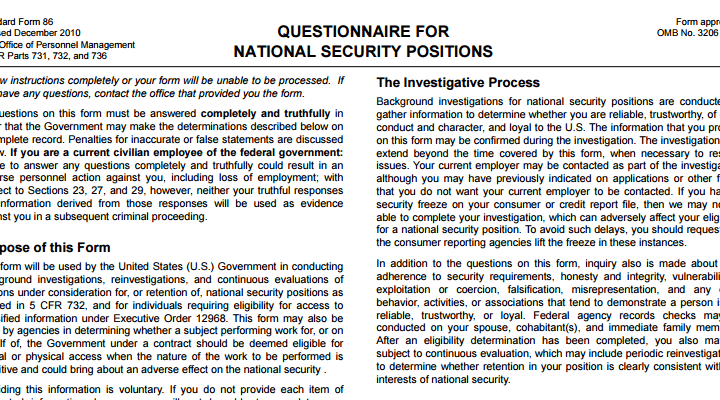Recently, a ClearanceJobs.com discussion board poster raised the following great question:
Why does the government only care about certain types of arrests if they occurred within the last seven (7) years, but they want you to list others no matter how old?
The comment was ostensibly referring to Standard Form (SF) 86, which all security clearance holders know to be the foundation of both their initial investigation and subsequent periodic reviews. Indeed, a review of that document shows that a security clearance applicant is required to report any of the following that occurred within the seven (7) years preceding the date on which the applicant signs the form: arrests; criminal charges, convictions, or sentencing; probation or parole; or, summonses (excluding traffic citations with a fine of less than $300 that did not involve alcohol or drugs). (See Question 22.1).
Yet the following question then asks the security clearance applicant to report whether any of the following has EVER occurred (See Question 22.2):
- Conviction in any U.S. court of a crime, for which the sentence exceeded 1 year and the individual was incarcerated for more than 1 year;
- A felony charge;
- A domestic violence conviction;
- A charge involving alcohol, drugs, firearms, or explosives
It is understandable that some applicants may bristle at the need to provide an affirmative response to Question 22.2 after answering “no” to the prior section; after all, many people make juvenile mistakes in their younger years, only to self-reform and/or mature. One can imagine the unpleasant reminder of a past mistake rearing its head every time a security clearance holder is up for periodic review.
On the other hand, there are policy reasons why each component of Question 22.2 exists. For example, a federal law known as the “Bond Amendment” bars agencies from granting an individual who has been convicted, sentenced to, and actually served more than one year in jail access to certain categories of highly classified information – Sensitive Compartmentalized Information (SCI), Special Access Programs (SAPs), and Restricted Data (RD) – unless a meritorious waiver is deemed to apply.
Similarly, a different federal law known as the Lautenberg Amendment bars anyone who has been convicted of a domestic violence crime from access to firearms. Obviously, that would prohibit someone with a domestic violence conviction from working in most law enforcement-related positions – a fact that the government would need to know when evaluating a candidate’s suitability for such a position.
Finally, addiction science research that shows that someone who is involved extensively with illegal drugs or alcohol abuse at an early age is more likely to re-offend later in life, requiring perhaps a lengthier time of sobriety before meriting the fiduciary responsibility of a security clearance. After Fort Hood and the Navy Yard, the firearms and explosives questions should speak for themselves.
Of course, that still leaves the catch-all of any “felony charge”, no matter the age of the incident. It is an unfortunate fact of life that many security clearance applicants who accepted a plea agreement on felony charges (thereby reducing them to misdemeanor convictions), find themselves still locked into reporting the original charges to personnel security officials years or even decades later. Yet, as I have previously explained in this forum, security clearance adjudications are more about the underlying conduct than the consequences. Conservation of judicial resources, and the requirement of “proof beyond a reasonable doubt”, is simply not relevant in this context, where a security clearance is deemed a privilege over a right.
Given those realities, this author is admittedly surprised at the category of offense NOT included as an “EVER” question on the SF-86: sex crimes.
After all, the same logic that forms the basis for the addiction science referenced above arguably applies to sex offenders. That’s why so many jurisdictions have implemented mandatory sex offender registries.
At the end of the day, I can only speculate as to why the government does or doesn’t do certain things – and this is one of them. Perhaps the matter is something for the SF-86’s drafters to contemplate.
This article is intended as general information only and should not be construed as legal advice. Consult an attorney regarding your specific situation.




